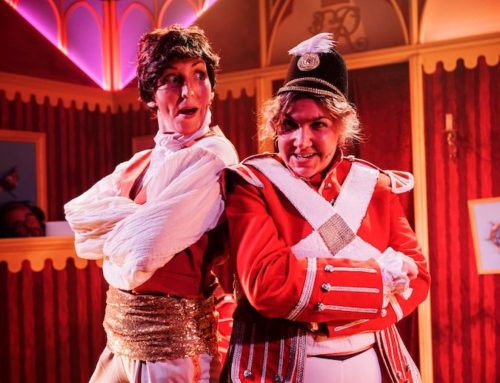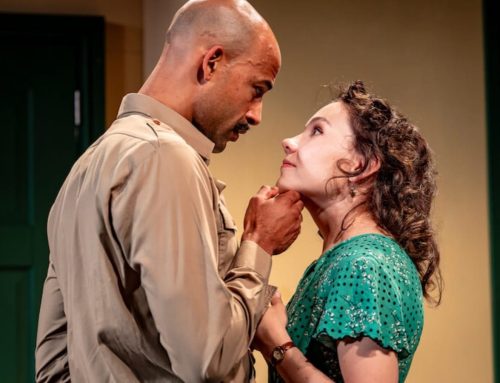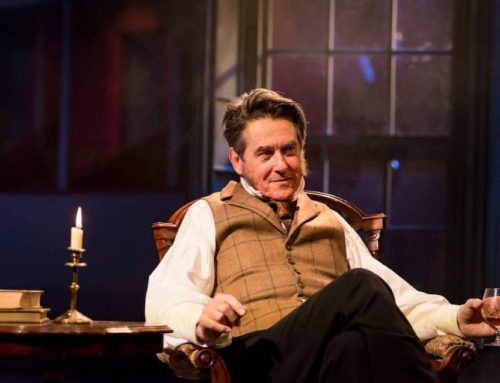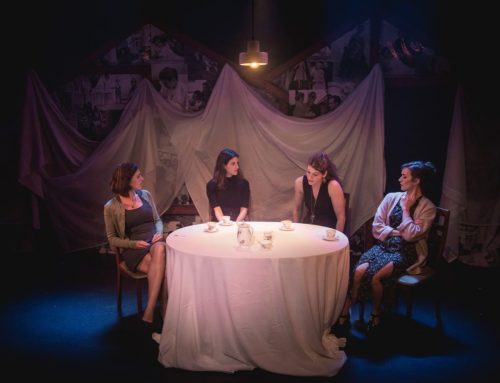Leading dramatist Roy Williams has a consistent fascination with Black British identity, most recently explored in the National Theatre’s inspiring Death of England: Delroy, and in Hampstead Theatre’s patchy The Fellowship which sees sisters row while their aging mother lies dying upstairs. In some respects, Williams adaptation of Lonely Londoners, Sam Selvon’s 1956 novel about Windrush generation immigrants, feels like a prequal to both. Broodingly atmospheric, impeccably performed in patois, and upliftingly joyous in its celebration of the power of community, the piece nevertheless struggles to shape Selvon’s mostly plotless series of loosely connected vignettes into a persuasive narrative.
Moses (Gamba Cole oozing easy going charisma and charm) lives in a small room in Bayswater, eking out a living with occasional construction jobs and without much to show for a decade in London. He passes his time chasing sex workers, hunting pigeons for food, and penning poetic letters to a son back home that he never sends. The man’s erstwhile lover Christina (an ethereal Aimee Powell who sings beautifully) appears in a series of flashback sequences that hint at the reason why Moses, who despairs of cold, grim, unwelcoming London, can never go home to Trinidad.
Moses lies at the centre of a quartet of friends whose comradery offers each one cigarettes, solace, and emotional support in the face of implacable racism, and whose intertwining exploits provide the momentum for Williams’ adaptation. Galahad (a sparky Romario Simpson), newly arrived from Trinidad, shows up on Moses’ doorstep in search of somewhere to stay. “There’s no bay and no water” says the bemused neophyte, who has nothing except a toothbrush and pyjamas to his name and imagines he will walk into a job with ease. “This city has eyes, and it watches every move you make” the jaded Moses warns him as they top and tail in Moses’ single bed. Rejected by employers and landlords who tell him “no dogs, no Irish, no blacks” Galahad soon concludes bitterly, “it is not us the white people hate, it’s our colour”.
Then there is Big City (Gilbert Kyem Jnr), a wartime RAF mechanic from Jamaica who now gets by selling tickets for poorly attended parties and minor law-breaking. City struggles with names of London’s many villages, Padding Town, and Notting Hill Fence among them, and avoids prison mainly due to the sheer incompetence of his white partners in crime. The final member of the foursome is angry, pugilistic Lewis (a ruminating and intensely physical turn by the marvellous Tobi Bakare) whose efforts to survive in London are compounded by the unexpected arrival of his strong-willed wife Agnes (Shannon Hayes) and demanding mother Tanty (Carol Moses).
The racism the characters encounter is mostly explored through monologues charting their reactions: rage, pain, courage, and endurance in the face of sometimes brutal and sometimes unwitting verbal (and occasionally physical) assaults. Agnes’ determined refusal to accept sub-standard cauliflowers from a market trader is marvellously rendered by Hayes in one such vignette. Galahad’s obdurate refusal to apologise for taking a white women to the cinema, and the pain and humiliation of the subsequent beating he suffers, is another. Two-thirds of the way through Lonely Londoners the seven characters emit a shared primal scream of fury at the sheer injustice of the treatment they suffer. It is hard not to join in.
Williams (and Selvon) eschews the temptation to romanticise these characters. Each man is flawed, particularly the domestic abuser Lewis. What redeems them is the power of their respect and love for each other, and their ability to offer up what limited support they can unbegrudgingly. A final choreographed sketch (one of several physical theatre interludes from director Ebenezer Bamgboye) in which the men dance, physically holding each other up, expresses this perfectly, as does the fact none of the characters ever leave the stage. Each sits mute in the background when not performing, a source of silent yet ready succour should the need arise.
If there is something missing from this evocative and joyous piece of theatre it is a central narrative and much of a sense of time. A thin narrative strand around a post office robbery is easily resolved, as is Anges’ response to abuse, which leaves the piece feeling heavy on atmosphere and light on action. Laura Ann Price’s stripped back design – packing cases, stripped pine floor, and banks of garish lights evoking tone and spelling out London postcodes – strips the piece of any feel of the ’50s. The same goes Tony Gayle’s anachronistic soundtrack which sees Galahad’s arrival to “mother country” accompanied by jarring punk.
Writer: Sam Selvon (adapted by Roy Williams)
Director: Ebenezer Bamgboye
More Recent Reviews
Playfight. Soho Theatre.
Writer Julia Grogan’s breathtakingly assured debut play arrives at Soho Theatre following stellar reviews at the Edinburgh Fringe and [...]
All The Happy Things. Soho Theatre.
Naomi Denny’s three-hander comedy-drama All The Happy Things covers familiar themes within a recognisable premise. A grieving protagonist comes [...]
Telly. Bread and Roses Theatre.
The challenge with absurdist comedy is that many people do not find it funny. Laughing at the sheer weirdness [...]






